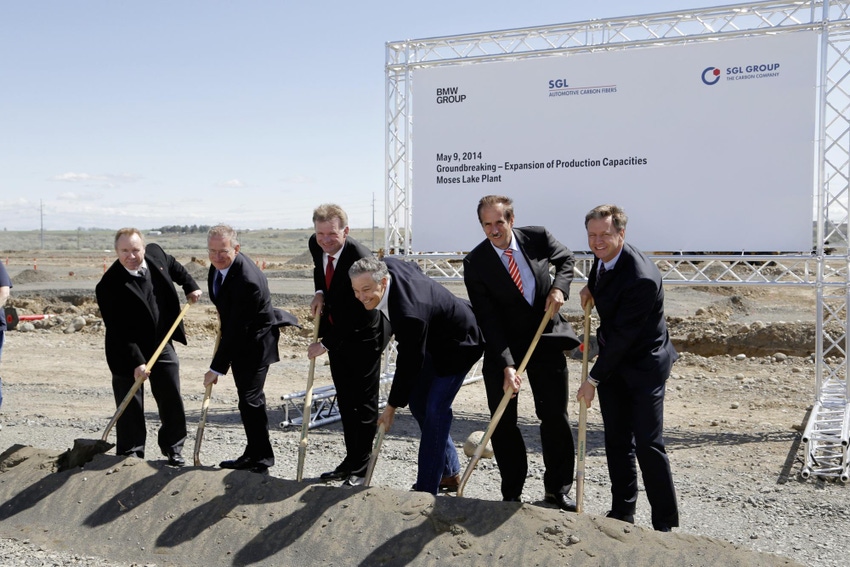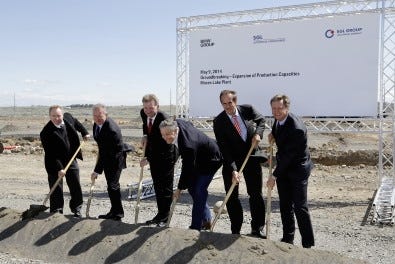Anticipated growth in demand for carbon fiber in automotive applications has prompted SGL Automotive Carbon Fibers (Wiesbaden) to triple the capacity of its carbon fiber plant in Moses Lake, WA. The joint venture partners, SGL Group and BMW Group, recently broke ground on the $200 million expansion, scheduled to be completed by early 2015, making it the world's largest carbon fiber plant.
May 14, 2014

Anticipated growth in demand for carbon fiber in automotive applications has prompted SGL Automotive Carbon Fibers (Wiesbaden) to triple the capacity of its carbon fiber plant in Moses Lake, WA. The joint venture partners, SGL Group and BMW Group, recently broke ground on the $200 million expansion, scheduled to be completed by early 2015, making it the world's largest carbon fiber plant.
The expansion at Moses Lake will reportedly make it possible for the BMW to apply carbon fiber material in other model series in the future, at competitive costs and in large quantities. The energy needed for the carbon fiber production is fully generated from hydropower.
|
More carbon fiber on the way, at competitive cost. |
At present, the Moses Lake plant operates two production lines, exclusively for BMW i, with an annual output of approximately 3,000 tonnes of carbon fiber. . Since the start of the year, the Leipzig, Germany plant has built over 5,000 BMW i3 vehicles. At present, the production output stands at 100 units a day. Furthermore, the BMW Group has been applying the ultra-lightweight high-tech material also in its BMW M models for the past ten years.
This summer, SGL Automotive Carbon Fibers will commission a third and fourth production line in Moses Lake, which are currently being built, thus doubling the plant's capacity to 6,000 tonnes per year. Today's groundbreaking ceremony for a fifth and sixth production line has been the first step toward tripling capacities to 9,000 tonnes annually in the medium term.
"With its highly automated carbon fiber production and stringent quality standards, Moses Lake is setting new standards in the industry. At present, the site is the world's fastest growing carbon fiber producer. Together with the BMW Group, we are doing pioneering work to establish CFRP as a material in large-series automotive production. In a mix of materials, CFRP offers new opportunities in lightweight construction for an eco-friendly mobility," explained Jürgen Köhler, CEO of SGL Group.
Klaus Draeger, Board Member Purchasing and Supplier Network at BMW AG: "CFRP is a key material for the automotive industry of the 21st century. In our endeavor to identify increasingly lightweight materials in order to reduce a vehicle's weight and thus its fuel consumption and carbon emissions, this material plays a crucial role. As part of an intelligent mix of materials, we will apply carbon also beyond our BMW i and BMW M models in the future. Thanks to the pooling of the SGL Group's expertise and our knowledge in large-series production of CFRP components, we will be able to produce the ultra-lightweight high-tech material also for other model series, at competitive costs and in large quantities."
The production of carbon fiber composites for automotive manufacturing requires several process steps: The necessary precursor, which is based on polyacrylnitrile fiber, is made by a joint venture between SGL Group and the Japanese company Mitsubishi Rayon in Otake, Japan. In a next step, polyacrylnitrile fiber is turned into the actual carbon fiber in Moses Lake. This material is then processed at the second joint venture site in Wackersdorf, Germany, and turned into textile carbon fiber layers, the starting point for the production of CFRP body parts at the BMW plants in Landshut and Leipzig.
About the Author(s)
You May Also Like



